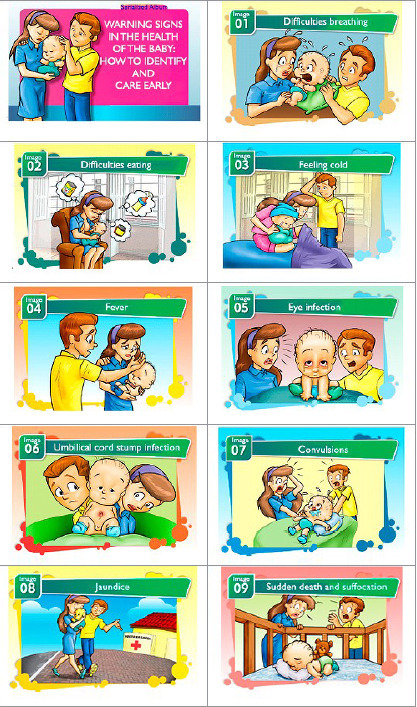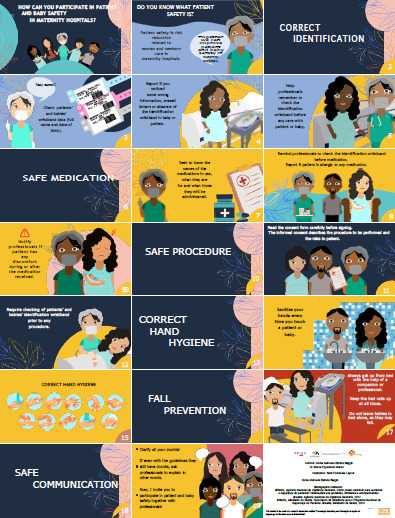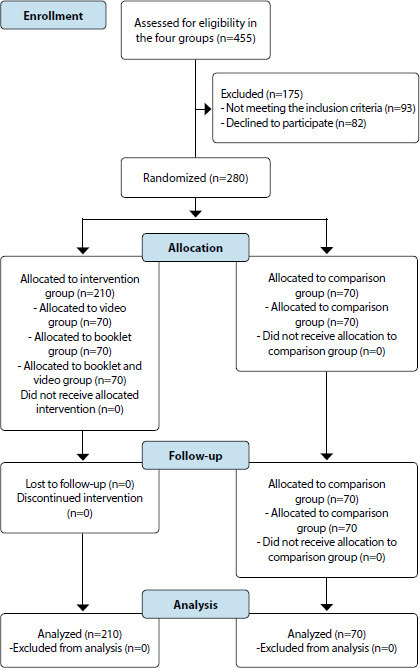-
ORIGINAL ARTICLE09-26-2022
Educational technology for infants’ families to identify warning signs: a validation study
Revista Brasileira de Enfermagem. 2022;75(5):e20210964
Abstract
ORIGINAL ARTICLEEducational technology for infants’ families to identify warning signs: a validation study
Revista Brasileira de Enfermagem. 2022;75(5):e20210964
DOI 10.1590/0034-7167-2021-0964
Views0See moreABSTRACT
Objective:
To validate, with the target audience, the usability and appearance of a serialized album about the warning signs to the health of children below 2 months.
Method:
Methodological validation study with the target population of an educational material in the form of a serialized album. 11 mothers with children under 2 months of age participated. The domains evaluated were: Objectives, Organization, Writing Style, Appearance, and Motivation. Data were analyzed using descriptive and statistics, and the data agreement index was calculated.
Results:
The global data agreement index was high (0.99). Mothers had positive responses, recognizing the excellence of the material: attractive figures that were easy to understand.
Conclusion:
The validation of the serialized album provides mothers with the abilities and knowledge they need to identify warning signs in regard to the health of their children, providing them with autonomy, corresponsibility, and helping them develop better child health practices.

-
ORIGINAL ARTICLE09-26-2022
Participatory development of educational technology in seeking patient safety in maternity hospitals
Revista Brasileira de Enfermagem. 2022;75(5):e20210701
Abstract
ORIGINAL ARTICLEParticipatory development of educational technology in seeking patient safety in maternity hospitals
Revista Brasileira de Enfermagem. 2022;75(5):e20210701
DOI 10.1590/0034-7167-2021-0701
Views1See moreABSTRACT
Objectives:
to develop a booklet as an educational technology, together with health professionals, patients and companions, aiming at their involvement in patient safety in maternity hospitals.
Methods:
a qualitative convergent care study, carried out in three stages at a maternity hospital in Belo Horizonte. The booklet construction took place between February and April 2021, with 13 professionals, 06 companions and 11 patients.
Results:
data content analysis was performed, creating three categories: Knowledge and experiences about patient and newborn safety in maternity hospitals; Challenges for involving patient and companion in safety actions; Assessment of patients, companions and professionals on the booklet construction process. The booklet construction involved the participation of health professionals, users and companions in all stages of the process.
Final considerations:
the participatory process enabled the creation of educational technology for the involvement of patients and companions in patient safety actions.

-
09-26-2022
Efeitos das tecnologias educacionais sobre a auto-eficácia materna na prevenção da diarreia infantil: um ensaio clínico
Revista Brasileira de Enfermagem. 2022;75(5):e20210339
Abstract
Efeitos das tecnologias educacionais sobre a auto-eficácia materna na prevenção da diarreia infantil: um ensaio clínico
Revista Brasileira de Enfermagem. 2022;75(5):e20210339
DOI 10.1590/0034-7167-2021-0339
Views1See moreRESUMEN
Objetivo:
evaluar el efecto de las intervenciones educativas sobre la autoeficacia materna en la prevención de la diarrea infantil en madres de niños menores de cinco años.
Métodos:
Ensayo clínico aleatorizado básico con 280 madres de niños menores de cinco años.
Resultados:
hubo un aumento estadísticamente significativo en los puntajes de autoeficacia materna después de la aplicación de las intervenciones. Hubo un aumento estadísticamente significativo en los puntajes de autoeficacia materna después de la aplicación del video (p= 0,026), folleto (p <0,001) y video y folleto (p <0,001).
Conclusión:
el uso combinado de video y folleto demostró ser más eficaz en la promoción de la autoeficacia que el uso aislado. Por lo tanto, se ha demostrado que las intervenciones utilizadas en este estudio aumentan significativamente la autoeficacia materna en la prevención de la diarrea infantil y, por lo tanto, pueden ser utilizadas por los profesionales de la salud como herramientas eficaces.
-
ORIGINAL ARTICLE09-26-2022
Effects of educational technologies on maternal self-efficacy in preventing childhood diarrhea: a clinical trial
Revista Brasileira de Enfermagem. 2022;75(5):e20210339
Abstract
ORIGINAL ARTICLEEffects of educational technologies on maternal self-efficacy in preventing childhood diarrhea: a clinical trial
Revista Brasileira de Enfermagem. 2022;75(5):e20210339
DOI 10.1590/0034-7167-2021-0339
Views0See moreABSTRACT
Objective:
To evaluate the effect of educational interventions on maternal self-efficacy in preventing childhood diarrhea in mothers of children younger than five years old.
Methods:
Basic randomized clinical trial involving 280 mothers of children under five years old.
Results:
There was a statistically significant increase in maternal self-efficacy scores after the application of the video (p= 0.026), booklet (p <0.001) and video and booklet (p <0.001).
Conclusion:
The combined use of video and booklet proved to be more effective in promoting self-efficacy than the isolated use. Thus, the interventions used in this study have been shown to significantly increase maternal self-efficacy in preventing childhood diarrhea and, therefore, can be used by health professionals as effective tools.

-
REVIEW09-26-2022
Eating self- efficacy in overweight and obese children and adolescents: integrative review of instruments
Revista Brasileira de Enfermagem. 2022;75(5):e20210301
Abstract
REVIEWEating self- efficacy in overweight and obese children and adolescents: integrative review of instruments
Revista Brasileira de Enfermagem. 2022;75(5):e20210301
DOI 10.1590/0034-7167-2021-0301
Views1See moreABSTRACT
Objective:
To describe the characteristics of instruments to assess eating self-efficacy in overweight and obesity in children and adolescents.
Methods:
Integrative literature review, conducted in May 2020, in six databases (PubMed; Web of Science; Scopus; CINAHL, ADOLEC, and PsycINFO) with the following search strategy: Self-efficacy and (Overweight OR Obesity) and (Child* OR Adolescent).
Results:
The inclusion of thirty-five articles and twenty-one instruments was applied to children 6 to 9 years old (n=2), adolescents 10 to 19 years old (n=9), and children and adolescents 7 to 18 years old (n=10). The instruments have 4 to 30 items and vary from two to five dimensions, the most frequent being “healthy eating” and “physical activity.”
Conclusion:
There are different reliable instruments designed to assess eating self-efficacy in adolescents and children, indicating the importance of this construct for preventing and controlling obesity and overweight.

-
TECHNOLOGICAL INNOVATION09-24-2022
Transitional care from the hospital to the home in heart failure: implementation of best practices
Revista Brasileira de Enfermagem. 2022;75(1):e20210123
Abstract
TECHNOLOGICAL INNOVATIONTransitional care from the hospital to the home in heart failure: implementation of best practices
Revista Brasileira de Enfermagem. 2022;75(1):e20210123
DOI 10.1590/0034-7167-2021-0123
Views0See moreABSTRACT
Objectives:
Assess the compliance of the implementation of better evidence in the transitional care of the person with heart failure from the hospital to the home.
Methods:
Evidence implementation project according to the JBI methodology in a cardiology hospital in São Paulo. Six criteria were audited before and after implementing strategies to increase compliance with best practices. 14 nurses and 22 patients participated in the audits.
Results:
In the baseline audit, compliance was null with five of the six criteria. Strategies: training of nurses; reformulation of the hospital discharge form and guidance on self-care in care contexts; and making telephone contact on the 7th, 14th and 21st days after discharge. In the follow-up audit, there was 100% compliance with five of the six criteria.
Conclusion:
The project made it possible to increase the compliance of transitional care practices in people with heart failure with the recommendations based on the best evidence.

-
ORIGINAL ARTICLE09-24-2022
Nurses’ performance in palliative care: spiritual care in the light of Theory of Human Caring
Revista Brasileira de Enfermagem. 2022;75(1):e20210029
Abstract
ORIGINAL ARTICLENurses’ performance in palliative care: spiritual care in the light of Theory of Human Caring
Revista Brasileira de Enfermagem. 2022;75(1):e20210029
DOI 10.1590/0034-7167-2021-0029
Views1See moreABSTRACT
Objectives:
to analyze nurses’ role in assisting patients in palliative care, with emphasis on the spiritual dimension, in the light of Theory of Human Caring.
Methods:
this is an exploratory, qualitative study, carried out in a hospital in João Pessoa, Paraíba, between August and December 2019, with 10 nurses. For data collection, semi-structured interviews were used. For analysis, we opted for content analysis.
Results:
the spiritual dimension of care is contemplated by several religious and spiritual practices. These are respected and encouraged by nurses, although there is difficulty in providing care for the spiritual dimension.
Final Considerations:
nurses have attitudes consistent with Jean Watson’s Theory and apply the Caritas Process elements during assistance to patients’ spiritual dimension in palliative care.
-
ORIGINAL ARTICLE09-24-2022
Patient safety in nursing technician training
Revista Brasileira de Enfermagem. 2022;75(1):e20201364
Abstract
ORIGINAL ARTICLEPatient safety in nursing technician training
Revista Brasileira de Enfermagem. 2022;75(1):e20201364
DOI 10.1590/0034-7167-2020-1364
Views0See moreABSTRACT
Objectives:
to analyze the contents on patient safety in the training of nursing technicians.
Methods:
a documentary study, conducted in three technical nursing courses at a public university in northeastern Brazil, based on the Multi-Professional Patient Safety Curriculum Guide, published by the World Health Organization.
Results:
we found that, of the 26 subjects in each course, the tracking terms were found in 22 subjects in the A/C courses, 23 in the B course. The topics of the guide with the highest number of terms were the improvement in medication safety, with 85 terms (22.6%), and Infection prevention and control, with 75 terms (20%). The contents do not express the comprehensiveness of patient safety education; some subjects had this focus, while others did not.
Conclusions:
the documents revealed gaps in the contents related to patient safety and demonstrated that they are addressed only in the course syllabus and discipline plans.
-
ORIGINAL ARTICLE07-08-2020
Patient safety: perception of family members of hospitalized children
Revista Brasileira de Enfermagem. 2020;73(5):e20190525
Abstract
ORIGINAL ARTICLEPatient safety: perception of family members of hospitalized children
Revista Brasileira de Enfermagem. 2020;73(5):e20190525
DOI 10.1590/0034-7167-2019-0525
Views0See moreABSTRACT
Objectives:
to know the meaning attributed by family members to the health safety of pediatric patients, with attention to the possibilities of their collaboration.
Methods:
this qualitative study was conducted with eighteen family members of children hospitalized in a pediatric unit, from January to July 2018. Symbolic Interactionism was used as a theoretical framework, and Inductive Content Analysis as method.
Results:
child hospitalization poses risks to possible incidents and adverse events. Participants and professionals are responsible for patient safety. Thus, their actions focus on error prevention. Therefore, they seek information and observe in a vigil way professional care in classic aspects of safety. They conceive essential and favoring safety the approach centered on children and family members.
Final Considerations:
family members recognized the chances of errors and care damage, identified themselves as support in minimizing damage and were in partnership with the professional, increasing chances of effecting safety.
-
ORIGINAL ARTICLE02-10-2020
Motivation and difficulties to reduce or quit smoking
Revista Brasileira de Enfermagem. 2020;73(1):e20180188
Abstract
ORIGINAL ARTICLEMotivation and difficulties to reduce or quit smoking
Revista Brasileira de Enfermagem. 2020;73(1):e20180188
DOI 10.1590/0034-7167-2018-0188
Views0See moreABSTRACT
Objective:
To understand what factors motivate people to reduce or stop tobacco use and what difficulties they face in this process.
Method:
Qualitative, empirical and interpretative research that used a focal group technique for data collection and Discourse Analysis as a theoretical reference for analysis.
Results:
The responses centered on the following aspects: motivation for reduction or cessation of smoking, family and community support received during treatment, benefits from cessation of tobacco, difficulties encountered and strategies for overcoming triggers.
Final Considerations:
The results showed that the users expressed their desire for cessation of tobacco use and that to achieve this goal, family and group support, professional help and changing habits are key factors for this process.
-
08-20-2021
Historicity of nursing graduate studies in Brazil: an analysis of the Sociology of the Professions
Revista Brasileira de Enfermagem. 2021;74(6):e20190827
Abstract
Historicity of nursing graduate studies in Brazil: an analysis of the Sociology of the Professions
Revista Brasileira de Enfermagem. 2021;74(6):e20190827
DOI 10.1590/0034-7167-2019-0827
Views0See moreABSTRACT
Objectives:
to analyze the scientific productions about the history of graduate studies in Brazilian nursing in the light of Eliot Freidson’s Sociology of the Professions.
Methods:
an integrative review, carried out in the databases indexed in Virtual Health Library. The Preferred Reporting Items for Systematic Reviews and Meta-Analyses recommendations were followed. Thematic content analysis and Eliot Freidson’s concepts were adopted.
Results:
two categories emerged: “Institutionalization of graduate courses in Brazilian nursing”, highlighting the historical process of professionalization in nursing through transition from empirical to professional care, subsidized by the monopoly of the construction of one’s own knowledge; “The scientific production of graduate nursing in Brazil”, showing the strengthening of a new generation of nurse researchers, given the greater scientificity in teaching due to implementation of graduate studies.
Final Considerations:
the analyzes present the historicity of graduate studies’ institutionalization, supporting the understanding of professionalization outlines of Brazilian nursing.

-
ORIGINAL ARTICLE12-21-2020
Knowledge and practices of nursing professionals in caring for ostomates
Revista Brasileira de Enfermagem. 2020;73:e20200018
Abstract
ORIGINAL ARTICLEKnowledge and practices of nursing professionals in caring for ostomates
Revista Brasileira de Enfermagem. 2020;73:e20200018
DOI 10.1590/0034-7167-2020-0018
Views0See moreABSTRACT
Objective:
to analyze the knowledge and practices of nursing professionals in caring for people with colostomy bag.
Method:
a qualitative and descriptive study conducted with 21 nursing professionals from a General Surgery Unit. Data collection used triangulation of techniques, based on non-participant observation, analysis of nursing records, and semi-structured interviews. Analysis followed the spiral technique assumptions.
Results:
it was possible to comprehend the theoretical and scientific knowledge that subsidize practice; identify contradictions related to statement and care in the profession’s daily work and the intervening factors, which can facilitate and/or make the nursing care process difficult.
Final Considerations:
knowledge and practices of professionals in caring for ostomates occur within work experiences, in which socialization of knowledge makes it possible to expand the perspectives of care.
-
REFLECTION04-03-2020
Environmental health: emancipatory care challenges and possibilities by the nurse
Revista Brasileira de Enfermagem. 2020;73(3):e20180478
Abstract
REFLECTIONEnvironmental health: emancipatory care challenges and possibilities by the nurse
Revista Brasileira de Enfermagem. 2020;73(3):e20180478
DOI 10.1590/0034-7167-2018-0478
Views0See moreABSTRACT
Objectives:
to discuss challenges and possibilities for the construction of Environmental Health emancipatory care practices by the nurse.
Methods:
reflective analysis based on conceptual, theoretical, and methodological aspects of nursing care, under the emancipatory and critical perspective.
Results:
contemporary environmental issues involve complex determinants of the health-disease process. This fact requires the accomplishment of educative actions that encourage the change of environmental attitudes related to health-risk situations. In this sense, there are significant demands for emancipatory practices of primary care in Environmental Health by nurses, which need to be systematized by health and education institutions.
Final considerations:
the nurse, as an educator and social actor, should offer emancipatory practices of risk management, empowerment, and shared social and environmental responsibility, with a view to recovering an ecological well-being and social transformation, to improve environmental quality and human life.
-
ORIGINAL ARTICLE09-16-2019
Playful educational intervention with schoolchildren on intestinal parasitosis
Revista Brasileira de Enfermagem. 2019;72(5):1203-1210
Abstract
ORIGINAL ARTICLEPlayful educational intervention with schoolchildren on intestinal parasitosis
Revista Brasileira de Enfermagem. 2019;72(5):1203-1210
DOI 10.1590/0034-7167-2017-0551
Views0See moreABSTRACT
Objective:
To analyze the playful educational interventions in the knowledge of schoolchildren about intestinal parasitosis.
Method:
This is a quasi-experimental, non-randomized study, based on pre- and post-intervention, conducted in a public elementary school in a peripheric neighborhood in the city of Ribeirão Preto (SP). The study population consisted of 101 students enrolled in the 5th and 6th grade. For comparison, we used the generalized version of the McNemar chi-squared test.
Results:
Of the 101 schoolchildren who participated in the study, 48 (47.5%) were female and 53 (52.5%) were male, aged from 9 to 14 years. Students’ knowledge on intestinal parasitic infections has increased significantly after the playful educational intervention.
Conclusion:
Playful educational interventions are an excellent didactical resource in the teaching-learning process of schoolchildren.
-
ORIGINAL ARTICLE12-13-2019
Self-care deficits in women with leg ulcers and sickle cell disease
Revista Brasileira de Enfermagem. 2019;72:72-78
Abstract
ORIGINAL ARTICLESelf-care deficits in women with leg ulcers and sickle cell disease
Revista Brasileira de Enfermagem. 2019;72:72-78
DOI 10.1590/0034-7167-2018-0005
Views0See moreABSTRACT
Objective:
to identify self-care deficits in women with leg ulcers and sickle cell disease.
Method:
a qualitative, descriptive, exploratory approach with 14 women. The collection was performed from December 2015 to January 2016, while the analysis was supported by Orem’s Self-Care Deficit Theory.
Results:
self-care requirements are not fully met. The following were identified as universal: balance between loneliness and social interaction, rest and proper nutrition; development: inability to perform work, abrupt changes in the environment due to hospitalization, educational deprivation and dropout; health deviations: ulcer recurrences, pain, changes in skin appearance and gait changes.
Conclusion:
nursing care for women with leg ulcers and sickle cell disease requires planned actions for comprehensive care.
-
EXPERIENCE REPORT02-05-2021
Paulo Freire’s culture circles: contributions to nursing research, teaching, and professional practice
Revista Brasileira de Enfermagem. 2021;74(1):e20190626
Abstract
EXPERIENCE REPORTPaulo Freire’s culture circles: contributions to nursing research, teaching, and professional practice
Revista Brasileira de Enfermagem. 2021;74(1):e20190626
DOI 10.1590/0034-7167-2019-0626
Views0See moreABSTRACT
Objectives:
to share the contributions of culture circles for teaching, research, and professional nursing practice, having as framework Paulo Freire’s Research Itinerary.
Methods:
this is an experience report of a culture circle, with participation of three professors and ten students, enrolled in a course of a Graduate Program in Nursing in southern Brazil. In this culture circle, a tree was built in which the roots formed the thematic investigation, the stem, coding and decoding, and the leaves, the Research Itinerary critical unveiling.
Results:
participants demonstrated empowerment of Paulo Freire’s assumptions, and building a tree made it possible to discuss in a pleasant and playful way culture circle use in teaching, research, and professional nursing practice.
Final Considerations:
the culture circle promoted reflection and action on nursing praxis, turning Freirean thoughts into something concrete and transforming realities.

Search
Search in:
Nuvem de Tags
Adolescente (85) Atenção Primária à Saúde (239) COVID-19 (91) Criança (91) Cuidados de Enfermagem (269) Educação em Enfermagem (151) Educação em Saúde (139) Enfermagem (930) Enfermagem Pediátrica (86) Estudantes de Enfermagem (77) Estudos de Validação (131) Família (87) Idoso (208) Promoção da Saúde (99) Qualidade de Vida (104) Saúde do Trabalhador (86) Saúde Mental (145) Saúde Pública (82) Segurança do Paciente (150) Tecnologia Educacional (100)



